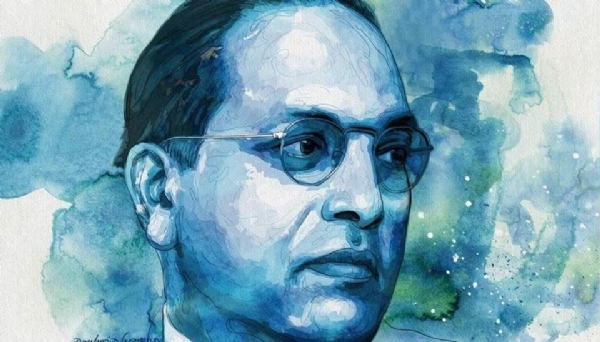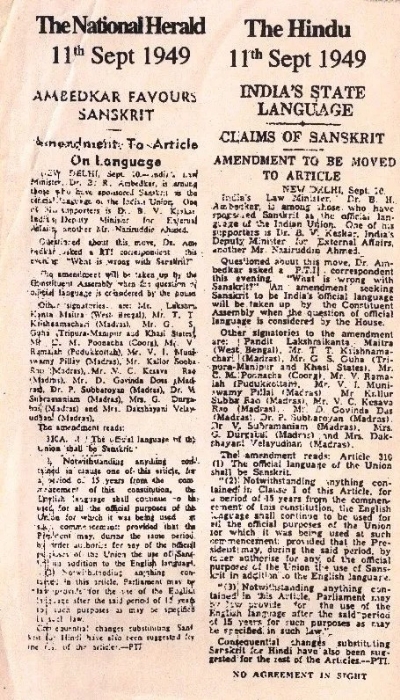NB Twitter Scan | Lesser known facts about the Dr. B.R Ambedkar, that liberals don’t want you to know about
Dr Ambedkar, as a law minister, wanted Sanskrit to be the national language of India.He believed that India 🇮🇳 shall develop as a culturally united nation-state.
This article on Dr. B.R. Ambedkar. is based on thread by @INSIGHTUK
Hiding the truth and presenting it in the wrong way is an old habit of some historical intellectuals. Just like how they hide some shocking historical facts, our so-called historical intellectuals have also tried to hide some facts about Dr. B.R. Ambedkar.

Dr. B.R. Ambedkar was a prominent social reformer, jurist, economist, and political leader in India. He dedicated his life to fighting for the rights of marginalised communities, including Dalits, women, and labourers. He was the principal architect of the Indian Constitution and played a crucial role in shaping modern India's democratic and legal systems.
He was a prolific scholar and a patriot. Honesty & foresightedness was visible in his actions.
In this thread, we'll explore some lesser-known facts they don’t want you to know about.
- 1. Baba Saheb considered the mahavakyas of the Upanishads the spiritual basis of democracy. In his famous speech to the Jat-Pat-Todak Mandal, Dr. Ambedkar made the suggestion that Hindus need not look anywhere outside their scriptures to build a society based on the principles of liberty, fraternity, and equality. They could look into the Upanishads for those values, he said.
Dr. Ambedkar considered the Hindu Civil Code the first step towards a uniform civil code.
The same Dr. Ambedkar who rejected outright the inhuman and outdated aspects of smriti traditions also demonstrated that the same tradition, with all its diversity, could be distilled to create a Hindu law that had prominent space for social democracy and gender justice.
He saw the Hindu Code Bill (HCB) as instrumental in moulding Hindu society into a unitary one based on the principles of liberty and equality. In a lecture delivered on January 11, 1950, he declared:The present bill is progressive. This is an effort to try to have one civil law for all the citizens under the constitution of India. The law is based on the religious scriptures of the Hindus.
- Dr Ambedkar, as a law minister, wanted Sanskrit to be the national language of India.He believed that India 🇮🇳 shall develop as a culturally united nation-state.
Despite his belief that English could be kept as the nation’s official language for at least 15 years after independence, Dr5 Bhimrao Ambedkar supported Sanskrit as a national language in the Constituent Assembly. The proposal to make Sanskrit as the national language was moved by the late LK Maitra in the Constituent Assembly, and was supported by Dr. Ambedkar

- Dr Ambedkar was against taking favour from missionaries for the 'Dalit' causes
He viewed their social reforms are not because of real concern but as a means for proselytisation. He was averse to missionaries meddling in the scheduled communities' affairs- Dr Ambedkar was against giving Indus water to Pakistan
Dr Ambedkar was against giving Indus water to Pakistan without Pakistan acknowledging Indian farmers’ first rights over the river.#AmbedkarJayanti2020 #DrBabasahebAmbedkar #BhimRaoAmbedkar pic.twitter.com/82Y05acf8p
— INSIGHT UK (@INSIGHTUK2) April 14, 2020
At a meeting of ministerial representatives from India and Pakistan on 3rd May (1948), Dr Ambedkar, for India, insisted that no water could be supplied until Pakistan accepted India’s legal claim that all the water belonged to East Punjab, who had the right to do with it as they wished. The chief Pakistan representative, Mr Gulam Mohammed, came to see Lord Mountbatten after the meeting had broken down on this point. The Governor General immediately phoned Pandit Nehru and expressed his disgust that miserable peasants and refugees were being made to suffer when the matter was still under negotiation. Pandit Nehru agreed and undertook to get the conference going again and break the deadlock.
Dr Ambedkar wanted to have a complete exchange of populations between India and Pakistan. Otherwise partition will be an unfinished exercise.

